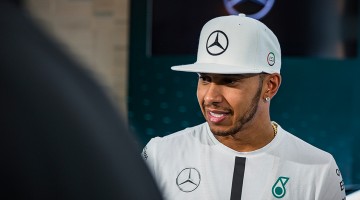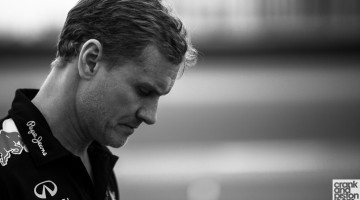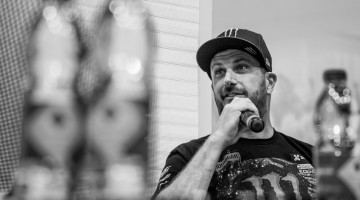crankandpiston.com speaks with six-time 24 Hours of Le Mans winner Jacky Ickx to discuss his achievements. Or, as turns out, not to…

There’s six hours of the 2014 24 Hours of Le Mans to run, and I’m about to grab a few words with six-time event winner Jacky Ickx in Porsche’s hospitality area. I’ve been privileged during my time with crankandpiston.com to meet and speak with some of the biggest names in motorsport, and the framework for these fascinating conversations is usually the same: an insight into how said name got into motorsport, his or her reflections across a career, set and/or unfulfilled goals, and a snappy quote to wrap everything up. Jacky Ickx though is different, and as he welcomes me to his table with a smile and cheery handshake, a quote of his keeps running through my head.
“As a driver you become famous, but you are just the final link in a chain of many who live in the shade, and work hard to do their jobs properly.”
It’s an extract from an interview I read a few years ago that has stuck with me ever since (Motor Sport Magazine I believe, though rather shamefully I can’t be sure). Here is a gentlemen with more than 100 Formula 1 starts to his name, more than 50 major victories across a two decade-long endurance racing career, one of only two Belgians to ever win an official F1 race, and a six-time 24 Hours of Le Mans winner until his 23-year record was overhauled by Denmark’s Tom Kristensen in 2005. The old rose-tinted glasses, I had assumed, would be working overtime during our chat. Asking him about his six Le Mans victories however, his answer comes as a surprise.
“If you offer a driver one win at Le Mans, he will not take it with one hand, he will grab it with two hands!” explains Jacky. “So you can imagine winning six times is very special, and for a long time I was the record holder at Le Mans. But I’ve always said that records – whatever they are – are there to be beaten. At some point and with a bit of luck, Tom [Kristensen] will win Le Mans for a tenth time. And that’s absolutely incredible. That’s a record that will never be beaten.”

Within seconds, focus has bounced from Jacky to his record-holding successor, and I’m a little thrown. With F1 giants Ferrari and Brabham, Jacky took eight Grand Prix victories. His tenure has included stints with former F1 champions Williams, Lotus and McLaren. On his way up the ladder, and at a mere 22 years old, the Belgian took on series legends Sir Jackie Stewart, Jim Clark and Graham Hill, and beat them. He twice competed in a staggering 84-hour endurance race around Europe’s most notorious race circuit – the Nürburgring – with only one co-driver. Between 1967 and 1983 (discounting DNFs) his lowest finishing position at Le Mans was 2nd. If anybody has earned the right to talk about his achievements, it is Jacky Ickx.
But no. Nursing an espresso – and encouraging me to try one, since they are ‘rather good’ – this amiable gentleman delves yet further into the race that defines him, with very little reference to that final link in the chain.
“There is something relatively unfair in motor racing,” he continues. “You only see under the spotlight, that is the drivers and the winners. I want you to keep in mind that Porsche is back at Le Mans for the first time in 16 years, and to do that, they have so many people concentrating on this project. Everyone is a link in the chain. For Porsche in 2014, they started from zero, and within two or three years they built up this operation”, as was explained by Head of Porsche Motorsport Hartmut Kristen. “You have to show your admiration for all these engineers, all these talented people, especially because Le Mans has changed a lot since 1998.
“It is not an endurance race anymore. We use the term to say it’s a long distance, but it’s not ‘endurance’: it’s a Grand Prix. It’s flat out for the engineers, mechanics and drivers and that is spectacular. Already we’ve seen an outstanding, action-filled race, full of incidents and brilliant driving. What we are watching is the pinnacle of motor racing, and we should all be grateful for the opportunity.”

It’s this ‘pinnacle of motor racing’ in which Jacky would take six victories (four with Porsche) between 1969 and 1982. Given the opportunity, despite never taking the green flag at Indianapolis or the chequered flag at Monaco, La Sarthe remains the race Jacky would take one more crack at under different circumstances. Strange to think that given his illustrious record, and despite growing up around father Jacques’ career as a motorsport journalist, motor racing never interested a young Jacky.
“I actually wanted to become a gardener when I was 16,” Jacky continues. “I was taken to races and found them very boring: I used to say, ‘please don’t bring me there again’. Maybe it comes from the fact that I was very poor at school and couldn’t pay much attention. My parents were frustrated, but began rewarding me when my grades started improving. The more successful I was, the bigger gift I got at the end of the year. One year I received a bike [a 50cc Puch] and with that, I discovered the pleasure of being on the podium. For me that was new and very exciting.”
Suddenly the enthusiasm that had been lacking during Jacky’s first visit to a race event – the 1955 Belgian Grand Prix, an event that brought the crowd to its feet as Mercedes teammates Sir Stirling Moss and Juan Manuel Fangio diced for victory – was growing with each passing competition. Class championships came his way before the door was opened for four-wheel competition.
“I was doing well in motorcycle racing and someone asked me if I’d like to drive a car. It was a BMW 700 coupé with the boxer engine from a motorcycle, and that was the first real production car from BMW in 1963. I drove that and drove it well, then someone came and said ‘would you like to drive a Cortina?’ Then it was a Ford Mustang, and by then I was attracting attention from Ken Tyrrell”, the former team principal who led Sir Jackie Stewart to all three of his F1 titles. “Soon I was driving a Formula 3 single seater, and then by 1967, I was in Formula 1. So it all happened quite quickly, but it was all down to timing. And destiny.”

Experience with the perilous nature of motorbikes meant the newboy on the tin top scene quickly established himself as a phenomenon in the wet (“you have to be very gentle with the throttle, otherwise you’re on the floor, and that hurts!”). Having netted both the Belgian and European Touring Car championships, single seaters soon beckoned, and in one of his first F3 outings in 1966, Jacky decimated the field at a sodden Silverstone to finish third, ahead of some of F1’s most respected names and despite starting from the back. After a period with Matra and Cooper, a Ferrari contract was in his pocket for 1968, his first victory coming just six races later at Rouens. Had circumstances been different, the ’68 crown might well have been his, a leg-breaking accident in Canada with just three races to run (and when he lay just three points behind eventual champion Graham Hill) bringing his charge to an end. Gentlemanly conduct during the 1970 season meant Jacky finished runner-up – as he had done the year before with Brabham – to Jochen Rindt, the Austrian having been fatally injured with three races of the season to run. To take a championship crown that, to Jacky, rightfully belonged to Rindt would have brought him “no pleasure”. It would be the closest the Belgian came to taking the F1 crown, and though his F1 career continued intermittently for another nine years, Jacky would stand atop the podium only twice more.
F1’s loss was sportscars gain, however. While it was close but no cigar on the F1 scene in 1969, the first of Jacky’s Le Mans victories came with the Ford GT40 that year in – what remains to this day – the closest finish ever at Le Mans. Barely three car-lengths separated the GT40 from Hans Hermann’s second-placed Porsche 908 after 24 hours of racing.
“Ah yes, Hans Hermann is a lovely, lovely man,” Jacky continues, his first espresso now gone and another now en-route. “I rarely speak to him about this era because he was beaten by 120m, so that was obviously very frustrating. But, when you are 23 years old – as I was then – and you have a car that is equivalent to your opponent in speed, and you have to fight against a person who is 34/35 – as Hans was then – things are different. When you are young, you have no fear. You brake 10m later. If your opponent goes 100kph into a corner, you go 101kph. So Hans is a very talented driver, that’s the rule in life. Sport is made for the young kids, and when you’re 40 there is no way you can drive like someone who is 20. You become wiser and you don’t take the same risks.”

Having deftly avoided talking about himself yet again, it’s an intriguing comment by Jacky, given that his victory with the GT40 was not the only talking point of the ‘69 race. Since its inauguration in 1923, the ‘Le Mans start’ – whereby drivers would sprint across the track and climb into their idling cars – had been an event staple. But as a demonstration against motor racing’s ever-increasing risks, Jacky walked across the track to the Ford, taking the time to buckle his race harness before driving off. It was a unanimously unpopular move but an apt one. On lap one, John Woolfe’s Porsche 917 speared into the barriers, an incident he would have survived had his seatbelt been buckled properly. By 1970, the traditional Le Mans start was gone.
In 1976 – after victory number two the year before with the Mirage GR8 – Jacky began his eventual 10-year tenure with Porsche in sportscars. A fruitful relationship it proved too, netting the Belgian another four Le Mans wins. Once again though, Jacky is unwilling to hog the credit for his achievements.
“My future in Formula 1 looked uncertain, and in the early days I was doing a lot of long distance racing. So for me it seemed a great opportunity to say yes to Porsche’s offer to join them and their new product in 1976.
“If you drive for Porsche, your chances of winning are greater.I won two times when I was almost a kid, and won four times with Porsche. But what you have to keep in mind is that I raced for ten years with Porsche, and ten years in the same team is a hell of a long time. Normally you don’t stay with the same team too long. So when I think about it, they are the reason of my success in long distance. Maybe I have the highest number of wins… I think over fifty in long distance races. But the reason for that is Porsche and everyone working in the shade.”

The final Le Mans win in 1982 came with the 956, which together with its 962C iteration proved one of Porsche’s most successful sportscars ever. Key to Jacky’s success however was the 936, with which he took three of his six wins in ’76, ’77 and ’81 (his ’77 in particular was the result of sheer grit and determination, an engine problem just four hours into the race dropping the entry to dead last at one stage). It’s as I nurse my own espresso – he’s right, it really is rather good – that I ask whether the 936 hold a special place in his heart. Not quite…
“The car you prefer is always the winning one!” he laughs. “When you win, no one complains about the car, and I drove in many different races so I have a lot to choose from!
“The car is basically the same: four wheels, a manual gearshift, no brake assistance, no steering assistance, no automatic gearbox, no cooling system, no drinking water in the car. I come from the motorcycle world, because in my early days I loved motorcycles, and I learnt the difficulty of road racing, so when I started racing cars, I learned a number of things. But I was not good at everything. In rallying for example, I was very bad. So, you know I’m far from perfect.”

If breaking records at Le Mans wasn’t enough, this ‘far from perfect’ Grand Prix winner took on the fearsome Dakar rally with the Mercedes-Benz 280G in 1983, and won. Not that he mentions this of course. His recollections of Dakar begins with Porsche’s first tentative steps on the event in 1984.
“Porsche was studying the first four-wheel drive transmission at the time, but we also had the 911 from the Eastern Safari, which was an off-road car. So, we had a car, and all we had to do was fit a four-wheel drive transmission in it. We entered in 1984, and it is the most difficult rally on the planet.
“The Dakar was strictly reserved for Toyota, Land Rovers, Mercedes, etc. When we – Porsche – came in, everybody said we had no chance. We won the first in 1984, lost the second and won the third in 1986. The third one we won with a flat-six, twin-turbo engine, electronic rear axle and front axle, and we put that in the middle of the desert. And the whole team for three cars was eighteen people for a gruelling event across 12,000km of desert. But we knew it could be done. That’s all about Porsche.”

By 1985, his F1 career long done and with his 41st birthday looming, Jacky Ickx hung up his helmet when a collision at that year’s 1000km of Spa – not of Ickx’s doing it must be said – cost German sensation Stefan Bellof his life. A rattled motorsport world couldn’t help but think back to Monaco 1984, a race curtailed by rain and ultimately red-flagged by clerk of the course Ickx, when Bellof – and a young Brazilian by the name of Ayrton Senna – looked set to take the race for victory down to the wire…
“It’s an obsession for the Brazilians! I met a Brazilian journalist the other day, and I told him ‘what’s the point of going back thirty years?’ He said, ‘no, no, millions of Brazilians want to know the story.’
“Both were incredibly talented drivers, and both are now gone. And it is pure luck. Better people than I have gone and I raced for thirty years, so it is definitely pure luck.” Even Jacky’s first Grand Prix win at Rouens in 1968 was marred by the death of French rookie Jo Schlesser.
His final endurance race victory though – aboard the 962C at the Malaysia 800km with Jochen Mass – would not be the amiable Belgian’s last race. In 2000, Jacky returned to Dakar with Toyota alongside daughter Vanina, a Le Mans competitor in her own right. The result – 18th – was inconsequential. For Jacky, it was just another way to compete and share the plaudits, of which there were many that year for the then-55 year old. Today, sitting at the 24 Hours of Le Mans, the enthusiasm for HIS race still burns for an entirely different reason.

“What these boys are doing is a Grand Prix for 24 hours. They have to give it 100 per cent because it is a Grand Prix. They have an engineer who tells you to switch this button every twenty seconds. They have to visualize the quantity of energy they have, the fuel they have. It’s so complicated and then you have traffic to navigate around. The concentration is very high, so congratulations to them, all of them.
“Racing is not just about speed. Yes, I have reached 390kph down the Mulsanne straight here, but this is not fascinating: hen you have done it ten times, you say ‘give me an extra fifty horsepower’, pass 400kph, ask for more, and so on. The excitement for me comes from the fact that you belong to one of the best, and – if possible – are the best. The true excitement comes from winning. I am not that romantic!”
With yet another cheery smile and a handshake, Jacky excuses himself from our conversation (he’s been invited to speak with the rest of hospitality area on-stage). It’s only as I look over our conversation a few hours later that I realise just how little about himself Jacky actually spoke. Life in the spotlight is clearly not for him, as much as he has earned the right. To experience such modesty from a living legend is something I had not expected going into this interview, and it is one of the reasons my time with Jacky Ickx will stay with me for years to come. I’ll always remember that particular link in the chain.



